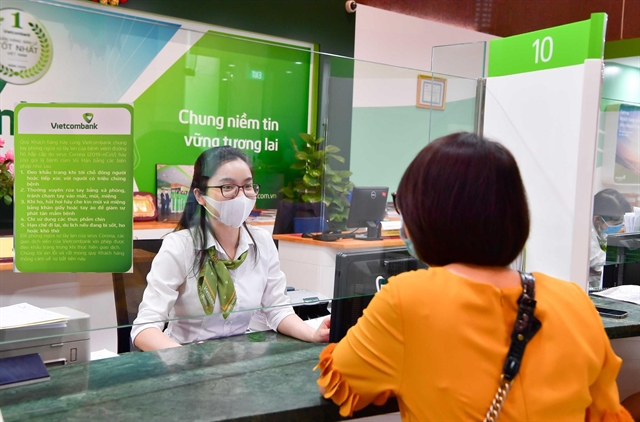 Economy
Economy

Shareholders are now focusing on news about bank dividends, especially as banks have been doing well throughout the past year despite the COVID-19 pandemic.

|
| A member of staff talking to a customer at Vietcombank's transaction office. VNA/VNS Photo Trần Việt |
HÀ NỘI — Shareholders are now focusing on news about bank dividends, especially as banks have been doing well throughout the past year despite the COVID-19 pandemic.
The draft document of the 2022 Annual General Meeting of Shareholders of Asia Commercial Joint Stock Bank (ACB) said that the bank will submit to shareholders a plan to issue more than 675 million shares to pay dividends at the rate of 25 per cent.
It is expected to be completed in the third quarter of this year, raising charter capital from nearly VNĐ27.02 trillion (US$1.18 billion) to over VNĐ33.7 trillion.
In 2022, ACB set a target of VNĐ15.02 trillion in profit before tax, up 25 per cent. The bad debt ratio is controlled below 2 per cent.
In a recent report, SSI Securities Corporation (SSI) estimated that ACB’s profit before tax would reach VNĐ14.8 trillion, up 24 per cent year-on-year, thanks to credit and deposit growth of 16 per cent and 7 per cent, respectively.
Meanwhile, in the 2022 business plan, Orient Commercial Joint Stock Bank (OCB) set profit growth at 25-30 per cent, maintaining a dividend of 20-25 per cent for shareholders.
Last year, OCB increased its capital from VNĐ11 trillion to nearly VNĐ13.7 trillion by paying a 25 per cent stock dividend. Nearly 274 million shares were issued to the market, bringing the total number of outstanding shares to nearly 1.4 billion.
Previously, Nguyễn Hoàng Linh, General Director of Vietnam Maritime Commercial Joint Stock Bank (MSB), said that he will submit to the General Meeting of Shareholders to approve dividend payment at the rate of 30 per cent for 2021. Capital raising plans will be submitted to the General Meeting of Shareholders by MSB for approval and implemented in 2022.
The bank’s leaders also said that its 2022 profit target is set at VNĐ6.8 trillion, equivalent to a growth rate of 30 per cent, while the asset size reaches VNĐ230 trillion and credit increases by 20-25 per cent depending on the approval of the State Bank of Việt Nam. The bad debt is controlled at less than 1.5 per cent.
In the coming annual general meeting of shareholders, it is expected that the plan to pay dividends in 2021 by shares with the minimum rate of 15 per cent will also be presented to shareholders by Saigon Hanoi Commercial Joint Stock Bank (SHB).
In 2021, SHB paid 2019’s share dividends at the rate of 10 per cent and that of 2020 at the rate of 10.5 per cent. It successfully issued shares to existing shareholders at a preferential price of VNĐ12,500 per share, thereby increasing its charter capital to over VNĐ26.67 trillion.
Similarly, Vietcombank (VCB) recently issued more than 1.02 billion shares to pay dividends from the remaining profit of 2019 at the rate of 27.6 per cent. After the issuance, the bank's charter capital increased by VNĐ10.23 trillion to more than VNĐ47.3 trillion.
At the end of April, Vietcombank plans to submit to shareholders a plan to raise charter capital in 2022. It also plans to issue nearly 308 million shares, equivalent charter capital for up to 99 investors. The charter capital thereby increased to more than VNĐ50.4 trillion.
Similarly, BIDV (BID) just completed a plan to pay a stock dividend at the rate of 25.7 per cent, raising the charter capital to nearly VNĐ50.6 trillion.
It also plans to issue 341.5 million new shares, equivalent to 8.5 per cent of charter capital through a public offering or private placement.
Vietnam International Commercial Joint Stock Bank (VIB) was the first bank that has successfully organised the Annual General Meeting of Shareholders and approved the plan to raise its charter capital to over VNĐ21 trillion, up 35.7 per cent.
Of which, VIB will distribute bonus shares at the rate of 35 per cent to existing shareholders and 0.7 per cent to employees (ESOP) from equity.
Clearly, many banks prefer the option of paying dividends in shares instead of cash.
The Banking Industry Outlook Report for 2022 of MBS Securities Company estimated that about 75 per cent of capital raising activities come from stock dividends, 22 per cent through private placement and issue of stock options, and about 3 per cent comes from ESOP.
Experts said that banks pay dividends in shares to increase capital, improve capital adequacy ratio, increase competitiveness, and have more resources to invest in technology, provide credit, and support businesses to overcome difficulties caused by COVID-19.
Directive No. 01/CT-NHNN on organising the implementation of key tasks in 2022 said that one of the banks’ tasks this year is to reduce operating costs, lower profits and not pay dividends in cash to spend resources on reducing lending interest rates to support people and businesses. VNS




